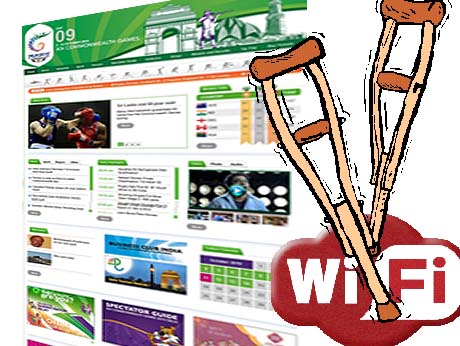
The well-choreographed opening ceremony appears to be an exception to the generally substandard technology experience that India has given the participating sportspersons and the global media at the ongoing Commonwealth Games. Pre-event hype spoke of key partnerships to ensure that state-of-the-art telecom and computer technology would be deployed to ensure wire-free Net access and a real time dissemination of results:
Telecom solution provider Ericsson deployed its broadband technology Fiber-to-the-Home (FTTH) at the Commonwealth Games Village using its Gigabit Passive Optical Network solution. Radius Infratel was Ericsson’s partner for this project and was entrusted with the responsibility for onsite deployment of the Gigabit Passive Optical Network (GPon) solution. Ericsson managed the network supporting the communication needs of 8000 dignitaries, athletes and team officials staying in the village spread over an area of 63.5 hectare (158.4 acre) with 14 blocks, 34 towers, and 1,168 flats.
Indian telecom provider Inventum Technologies had announced on September 27, that it had successfully commissioned secure WiFi access for officials, athletes and visitors at the Games . Inventum’s MSC Service Controllers were chosen to secure public Internet access using the WPA2 wireless standard. The project for public WiFi at the games village was implemented by Radius Infratel.
All these contractors are believed to have delivered what they were supposed to – but the end result was less than perfect, to put it mildly. The Delhi police unexpectedly banned the use of WiFi at venues because of security concerns, effectively rendering useless all the eloborate setups of WiFi hotspots. The WiFi Technology Forum reported that its own reporter as well as other journalists were forced to use their own Wireless data cards or dongles instead of promised public Wi-Fi at the games venues as well as in the Village.
The Timing, Scoring & Results (TSR) system, a key requirement in modern sporting events was procured by the Games Committee from Swiss Timing, for an estimated Rs 1.12 billion, five times more than what Melbourne paid for its TSR system at the last Commonwealth Game, reports the Times of India. Yet the official Games website http://www.cwgdelhi2010.org/ was painfully slow in reflecting the results. A decade after India staked claim to be an Info-tech powerhouse and IT services provider to the world, the country’s lack of professionalism in deploying such technology at the first major global logistical challenge on her own soil, will be difficult to live down – or explain away with flippant references to ‘Jugaad’ ( ‘arrangement’), ‘We are like that only’, ‘Indian wedding’ – or SHIT – Somehow In Time Technology.
IT industry experts have said in private that the Games lacked a strong project management plan and the designation of a single authority to deliver and be responsible for all the IT-enabled elements of the event.
Reports cited in this story:
Tech power India can't keep the Games website up and running. http://timesofindia.indiatimes.com/sports/commonwealth-games-2010/news/Tech-power-India-cant-keep-the-Games-website-up-and-running/articleshow/6721368.cms
Delhi CWG 2010, Journalists and others using Wireless Dongles instead of Wi-Fi http://www.wi-fitechnology.com/displayarticle3272.html
Commonwealth Games 2010: security lockdown prevents key technical access to venues http://www.telegraph.co.uk/sport/othersports/commonwealthgames/8036106/Commonwealth-Games-2010-security-lockdown-prevents-key-technical-access-to-venues.html
October 11 2010